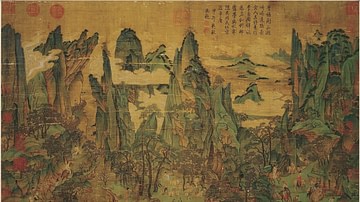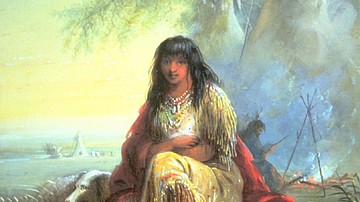Review

| Rating: | |
|---|---|
| Title: | |
| Author: | Anonymous |
| Published: | 1970 |
The Empress Wu Zetian (690-704 CE) is the only female ruler in the history of China. Even though there were many important and influential women throughout China's history, only one ever became the most powerful political figure in the country. She ruled China with complete authority and no one dared to challenge her when she was in control. As soon as her power began to slip though, and immediately after she died, historians began to criticize her rule primarily because she was a woman holding a traditionally male position of power. Wu Zetian's reign has been highly controversial ever since because later historians just accepted what earlier ones had written on Wu Zetian without considering the bias which might have been motivating the early historians.
N. Harry Rothschild's book, Wu Zhao: China's Only Woman Emperor, is a comprehensive work on Wu Zetian. Wu Zhao was her birth name before she took `Wu Zetian' ("Ruler of the Heavens") as her name on becoming emperor. Rothschild does not gloss over the difficult aspects of Wu Zetian's rise to power but places them in context and explains how and why this woman was demonized by the Chinese historians who wrote about her. He uses primary documents to show how the members of the court felt that nature had been turned upsidedown because a woman had assumed a man's role of ultimate authority. Rothschild tells the story of how, when one of her ministers requested in writing that she step aside because she was destroying the fabric of reality by assuming a man's position, Wu Zetian had him banished to the swamp lands and continued on with her reign. She refused to be controlled by men or the traditions men forced women to follow and believed she was the equal or better of anyone at court.
A very interesting aspect of Wu Zetian's reign is her devotion to Buddhism. Her predecessors had both favored Buddhism over other religions but Rothschild makes clear why Buddhism was especially important and politically useful to Wu Zetian:
Containing none of the longstanding historical and philosophical impediments to female rule that were imbedded so deeply in Chinese tradition, Buddhism offered Wu Zhao ideological and political validation. The universalism of Buddhism provided a common cultural ground that helped bring together the multi-ethnic inhabitants of her cosmopolitan empire. One Buddhist scroll written by Wu Zhao's non-Chinese subjects on the Western borderlands extolled her in glorious fashion (138).
This was a very different treatment from the one she received from the Chinese historians who wrote about her and Rothschild explains exactly why that would have been so. Even though their primary complaint was that she was a woman in a man's job, her refusal to compromise on any subject made her very difficult to deal with. Wu Zhao had been raised by her father to believe she was the equal of any man and she saw no reason to listen to her ministers, just because they were men, when she felt she knew better. Under her reign, China became incredibly prosperous and her reforms of the military, bureaucracy, agriculture, and imperial court all laid the foundation for the success of the later emperor Xuanzong (712-756 CE). Rothschild deals easily with her many accomplishments but does not gloss over the darker aspects of her reign such as the alleged murder of her infant daughter, framing innocents for crimes, executing or banishing anyone who might pose the slightest threat, or the secret police and informants she used to secure her rule.
Rothschild's writing style is very easy and interesting and he does a great job of bringing his subject to life. Wu Zetian was an interesting and complex woman and too many historians of the past have just repeated what earlier writers reported without much thought. Rothschild's work shows real depth and understanding of his subject and should be required reading for anyone studying Chinese history or thinking of enrolling in a Women's History course at university. Wu Zhao was one of the most interesting people in ancient Chinese history and Rothschild's book helps a reader understand who she was and why she should be remembered.
About the Reviewer
Cite This Work
APA Style
Mark, E. (2016, March 15). Wu Zhao: China's Only Woman Emperor. World History Encyclopedia. Retrieved from https://www.worldhistory.org/review/113/wu-zhao-chinas-only-woman-emperor/
Chicago Style
Mark, Emily. "Wu Zhao: China's Only Woman Emperor." World History Encyclopedia. Last modified March 15, 2016. https://www.worldhistory.org/review/113/wu-zhao-chinas-only-woman-emperor/.
MLA Style
Mark, Emily. "Wu Zhao: China's Only Woman Emperor." World History Encyclopedia. World History Encyclopedia, 15 Mar 2016, https://www.worldhistory.org/review/113/wu-zhao-chinas-only-woman-emperor/. Web. 24 Apr 2025.




